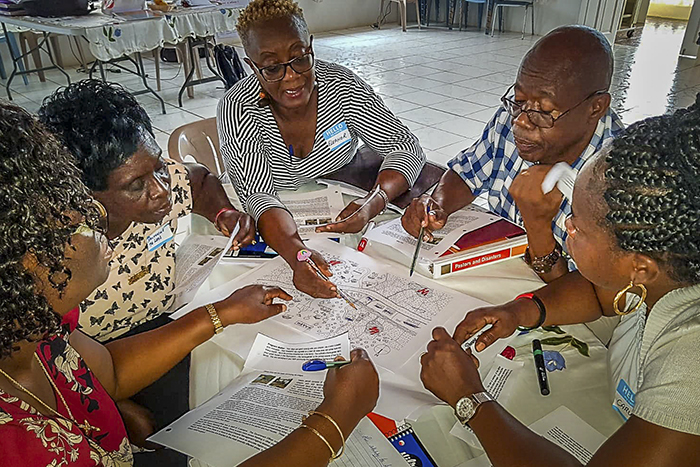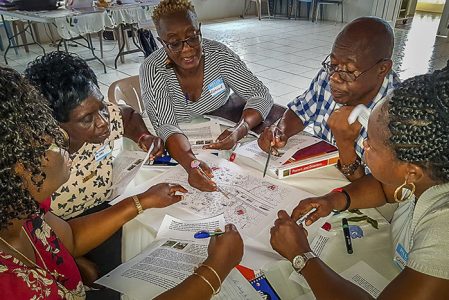
Participants at the Pastors and Disasters training workshop in Grenada carry out a mapping exercise from a the toolkit resource.Photo Credit: Janice Proud / Anglican Alliance
Anglicans from throughout the Caribbean have been taking part in a “Pastors and Disasters” workshop in Grenada. The workshop has been organised and hosted by the Church of the Province of the West Indies with the global Anglican Alliance, the US-based Episcopal Relief & Development, and the Canadian Primate’s World Relief and Development Fund. It was staged following a number of natural disasters and climate change-related events to hit the island nations.
“Churches and communities around the Anglican Communion are increasingly facing the devastating impacts of climate change”, a spokesperson for the Anglican Alliance said. “Exposed island communities are particularly vulnerable and extreme weather events such as hurricanes, cyclones, sea surges and flooding, as well as rising sea levels, are becoming the ‘new normal’. Churches are frequently at the forefront of responding to disasters and can also play a key role in building resilience to them.”
The participants at this week’s workshop, at St Martin’s Retreat Centre in Grenada, are from the West Indies’ dioceses of Jamaica and the Cayman Islands, Trinidad and Tobago, the Windward Islands, Guyana, and North Eastern Caribbean and Aruba; as well as the Episcopal Church’s Diocese of the Virgin Islands. They have been sharing their own experiences of disaster preparedness and resilience, learning best practice using the Pastors and Disasters Toolkit, and adapting it to the Caribbean context.
The Pastors and Disasters toolkit is a resource for community-based disaster risk reduction and management created by Episcopal Relief & Development in collaboration with other Anglican agencies. It distils knowledge and experience gathered from across the Anglican Communion and provides tried and tested practical tools for churches to respond effectively.
“I have enjoyed that the workshop has been so practical”, Tina Beazer, the Long Term Recovery Director of the Virgin Islands Diocese, said. “I love that it is a process and you can follow the process.
“I have gained knowledge and confidence from using the Pastors and Disasters tools. When I go back, I plan to discuss with [the] Archdeacon and start putting it into practice. In fact, I plan to give a copy to the Governor of the Virgin Islands, who I know personally.”
Claudette Marshall, from the Diocese of Jamaica and the Cayman Islands, said that a file visit during the workshop has “got to the heart of the matter.”
She added: “It gave us practical experience of the reality of using the tools. Thinking about our context, with a huge expanse with three suffragan bishops, we will need to break the work up and work in each of the regions.
“I have already spoken to the HR officer. We have a diocesan disaster plan, which is sent out to parishes each year; but ahead of the workshop we agreed that it would not be sent out until I got back. We will look at it and review the plan.”
The Anglican Alliance’s Disaster Response and Resilience Manager, Dr Janice Proud, said, “It is exciting to have such an enthusiastic group from across the Caribbean coming together to learn how to plan and prepare for disasters.
“We greatly appreciate the support of the bishops in the region for their wise selection of people to come and learn how to support the dioceses develop a preparedness plan. Participants have greatly appreciated both the focus of the toolkit on the role of the church and the participatory learning style that allows for adaptation to the local context.
“In all parts of the Anglican Communion the Anglican Alliance and partners are shifting the focus to support building resilience at all levels – diocesan, parish and individual. In this way the churches, communities and individuals can look to decrease their vulnerabilities and increase their capacity using their assets.”
First Published: ACNS
Posted on: March 15, 2019


